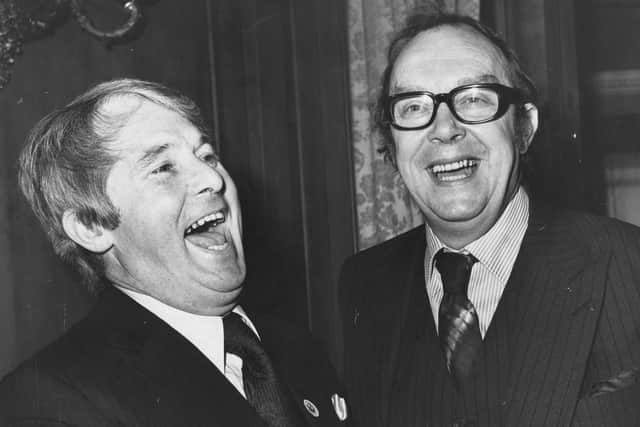Book review: Different Times: A History of British Comedy, by David Stubbs
At all other times they were sober of suit and sonorous of voice. Newsreaders, mostly – serious people off the telly. And yet somehow Morecambe & Wise persuaded them into sailors’ outfits to cartwheel across the floor singing There Is Nothin’ Like a Dame. It’s one of the all-time funniest moments in British comedy, witnessed by half the country when broadcast in 1977 and surely the other 50 percent subsequently. David Stubbs duly records it in his book but then does something unnecessary and, really, unforgivable. He points out that the acrobatics of Richard Baker, Kenneth Kendall and the rest are “clearly executed by stunt doubles”.
We know, spoilsport, we know! A few pages later he’s at it again with the revelation that in On the Buses the puddle which soaks Blakey, the inspector, “looks suspiciously like it has been hosed into place”. Don’t kill the magic! What, you never knew On the Buses possessed any? Neither did I, but suddenly I feel obliged to defend the rotten sitcom against such nitpicking (and to point out a fact not in the book: that the 1971 big-screen version was the year’s highest grossing movie, outdoing Diamonds Are Forever).
Advertisement
Hide AdBut maybe I’m nitpicking. These are two short sentences in a long text (400 pages, no photos). Except there are other irritations. Eric and Ernie’s – unseen – rumpy-pumpy with the young woman living next door is labelled by the author as “unfortunate”. Monty Python “didn’t really do women”. Similarly Hancock’s Half Hour is overly male. Harold Steptoe’s yearning to “pull a bird” is “sexist”. Reggie Perrin’s admiration of his secretary’s breasts is “creepy”. Benny Hill is “appalling”. The absence of black characters in the scripts of Ray Galton and Alan Simpson is a “shame”. Dad’s Army features “no person of colour”. Spike Milligan’s racial stereotyping was “obsessive”. The Goodies had an “unfortunate fondness” for blackface.


Many times I’ve scribbled “Aagh!” in the margins. Of course a lot of old – particularly 1970s – comedy is “unfortunate” when re-watched now. But these were the times. Weren’t the sitcoms of the age merely reflective of society’s attitudes to women and minorities – deeply regrettable but all too accurate? To be fair to Stubbs he loved a lot of these shows and their performers and says as much. But there are moments when he comes across as the not-so-secret love child of Mary Whitehouse and Captain No Fun, ceaselessly forensic in exposing the kind of jokes which wouldn’t be allowed today (and by the way no one’s trying to make it).
Now this is a pity. I’m a fan of Stubbs’ writing about rock. His previous book was a history of electronic music and the one before that celebrated krautrock (Oo-er, Frau, can we still call it that?). And there are some lovely passages here, beautifully crafted pen-portraits of humour’s high-water marks and titans of titter. Are You Being Served? is a low-water mark but Stubbs writes: “Shabby and faded as [its] world is, there’s a sense that it speaks to Britain about Britain, the kind of people we are: sexually repressed, grumpy but not militant, cheeky but not revolutionary, amused at relics like Captain Peacock but deferential to their benign authority.” (Now what was I saying? We get the comedy which we, at that specific time, deserve).
I started laughing along to sitcoms around the same time as Stubbs. He rates Lancashire-born Stan Laurel funnier than Londoner Charlie Chaplin and I agree. He loves Chris Morris almost as much as he does Joyce Grenfell, wishes he was back on our screens and who doesn’t? He prefers Alan Partridge to David Brent and I’m with him there, too. But I really wanted the book to have been more joke than woke.
Still, let’s finish on a gag, Terry-Thomas to Pablo Picasso: “I say: has anyone ever asked you: ‘Can I have a word in your eye?’”
Different Times: A History of British Comedy, by David Stubbs, Faber & Faber, £20